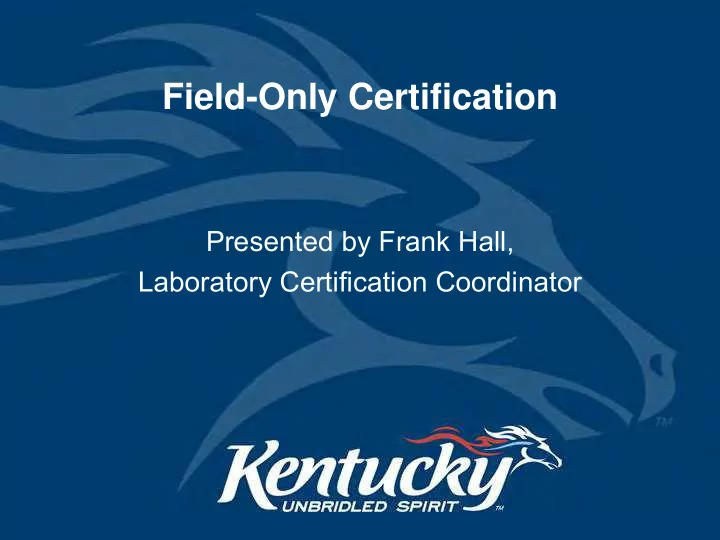

Field-Only Certification Presented by Frank Hall, Laboratory Certification Coordinator
Overview
Outline What is Laboratory Certification? Why Certification? Am I a Laboratory? What are considered field parameters? What do I need to apply? Field-only quality control What are the deadlines for certification?
What is Laboratory Certification?
What is Laboratory Certification? Laboratory certification is a process that provides formal recognition to the managerial and technical competence of a laboratory performing specific analyses defined by a certifying body or environmental program. 5
Why Certification?
Why Laboratory Certification? • NOI (Notice of Intent) filed October 7, 2010 regarding coal industry DMR data inconsistencies. • Performed PAI’s (Performance Audit Inspections) that included 27 laboratories performing wastewater analysis to meet the requirements of the KPDES permits. • Found poor documentation with little to no quality assurance/quality control (QA/QC) being performed. • There was no uniform standard of quality for the data being produced and no accountability for the laboratories actually performing the work. • KRS 224.10-670 gave the cabinet the statutory authority to promulgate administrative regulations establishing standards for the operation of laboratories. 7
Am I a Laboratory?
Field Parameters
Field Parameters • Short hold time or immediate tests – pH – Conductivity – Turbidity – Chlorine – Dissolved oxygen – Temperature 11
Application
The Application • Water.ky.gov – Programs • Laboratory Certification – Wastewater Lab Certification » KWLCP Application Essentials » KWLCP Application Form
What needs submitted? • Application • Payment • QAP • SOPs • Successful Proficiency Test Study (PT)
Field-Only QC
QC Requirements • WWLC – Chapter II • Field Analysis Quality Control 4.3.1 The following quality control measures apply to a certified laboratory performing residual chlorine, pH, conductivity, and turbidity analyses in the field: 4.3.1.1 Calibration of instruments shall be performed daily (when in use), using a primary standard; 4.3.1.2 A calibration verification shall be performed daily (when in use) using a second source. This may be accomplished using a secondary standard; 4.3.1.3 A method blank shall be analyzed daily (when in use, excluding pH); and 4.3.1.4 A quality control sample (QCS) shall be analyzed at least quarterly. A purchased second source standard in 4.3.1.2 that is a primary standard meets this requirement and no additional QCS is needed. 4.3.2 The following quality control measures apply to a certified laboratory performing dissolved oxygen, residual chlorine, pH, temperature, conductivity, and turbidity analyses in the field: 4.3.2.1 Duplicate analysis of samples shall be performed once per batch of twenty samples, at a minimum. Sample batches may extend beyond one day. 4.3.3 The following quality control measures apply to a certified laboratory performing in-line or continuous monitoring: 4.3.3.1 Analysis of a grab sample shall be performed utilizing an off-line meter once per month, at a minimum. This sample shall be evaluated as a duplicate analysis; and 4.3.3.2 The meter utilized for duplicate analysis shall meet the requirements established in 4.3.1 above.
PT Requirements –Proficiency Test Study •pH •Residual Chlorine •Conductivity •Turbidity
QC Summary
Deadlines
Deadlines • General laboratories – Submit application by: • October 1, 2014 – Obtain certification by: • January 1, 2015 • Field-only laboratories – Submit application by: • October 1, 2015 – Obtain certification by: • January 1, 2016
Questions ???
Contact Information Franklin C. Hall, Jr. (502)564-3410 extension 4959 DOWLabCertification@ky.gov
Recommend
More recommend